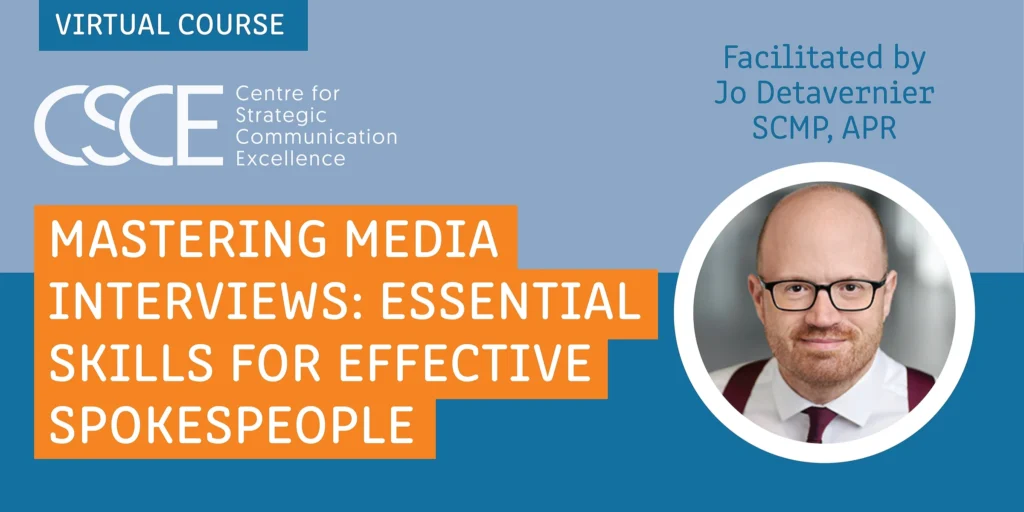Over the past week, I’ve spent time with communication professionals who are smart, capable and deeply committed to their craft. They’ve done the training, they know the theory and they care about making a difference in their organisations.
And yet, when the moment comes to step up as the trusted advisor they want to be, something holds them back. They hesitate before offering their opinion. They soften their advice to avoid pushback. They let decisions move forward even when they know in their gut that something’s not quite right.
This isn’t about whether people have the skills. That’s a different kind of confidence gap I’ve written about before. What I’m talking about here is when you do have the skills, but you hold back from using your voice when it really matters.
Competence is your ticket in, not the differentiator
Being good at what you do gets you in the room. But it doesn’t guarantee your voice will be heard. I’ve seen highly skilled communication professionals reduced to order-takers because they didn’t believe their perspective was valuable enough to challenge others at the decision-making table.
Competence matters, of course. But competence alone rarely earns you influence. Confidence is what allows you to use your skills in a way that shapes outcomes.
Many professionals tell me they struggle with imposter syndrome. I get it. I’ve been there too. They know they’re good at what they do but they worry others see them as junior, tactical or replaceable.
There’s also the natural hesitation that comes with challenging authority. If your CEO is heading down a path you believe will backfire, it takes courage to speak up and question it.
And then there’s the way our profession is often positioned. Too often, communication is seen as the team that “gets the message out” rather than the partner who shapes business decisions. That perception makes it harder for professionals to feel justified in speaking up.
What it really means to find your voice
Finding your voice doesn’t mean being the loudest person in the room. It means showing up with clarity and conviction. It means offering a perspective that helps leaders make better choices.
Sometimes it looks like asking a simple question no one else has thought to ask, like: What problem are we really trying to solve? Other times, it’s connecting the dots between strategy and people: If we take this approach, this is how our staff will respond.
Your voice is not about volume. It’s about value.
I learned this lesson the hard way early in my career. I’d been invited by a senior executive at the Australian Taxation Office to sit in on his executive meetings. I was the only non-executive at the table, and I saw it as a huge privilege.
One day, he asked for my view on an issue. I knew the answer, but I froze. I mumbled something vague and promised to come back with more detail. He looked at me and said words I’ve never forgotten: I thought you could think on your feet Sia.
I wanted the earth to open up and swallow me whole. It wasn’t that I didn’t know the answer to his question. It was that I didn’t have the confidence to articulate what I knew. That moment taught me that being in the room is one thing. Having the confidence to contribute when it counts is another thing entirely.
But confidence isn’t something you wake up with one morning. It’s built in small steps. Here are some practical ways you can start:
- Know your stuff. Preparation builds confidence. The more you understand the business context, the easier it is to speak with authority.
- Lead with questions. You don’t need to have all the answers. Ask thoughtful questions that redirect the conversation. What does success look like here? can open up an entirely new discussion.
- Focus on outcomes. Don’t position communication as an activity. Frame it in terms of the business outcome it enables. This approach will help staff feel confident in adopting our new strategy is far more powerful than We’ll draft a newsletter.
- Use evidence. Share data, examples or insights from past experiences. Leaders are more likely to listen when your perspective is grounded in fact.
- Start small. If speaking up feels daunting, start with lower-risk moments. Ask a question in a team meeting. Share an observation with a manager. Build up to the bigger conversations.
- Find your allies. Having a network of peers who remind you of your value makes a huge difference. Confidence grows when you know you’re not alone.
Years later, in a different role, I found myself in a similar situation. This time I spoke up. I challenged a decision respectfully and explained the potential risks from a communication perspective. It wasn’t easy, but instead of shutting me down, the executive listened. The conversation took a different turn and so did the outcome.
That moment built trust in a way no perfectly crafted email ever could. It reinforced for me that confidence doesn’t mean always being right. It means being willing to contribute what you see and know, in service of better decisions.
When you find your voice, you step into the role leaders truly need from communication professionals. Trusted advisors influence. They help leaders see what’s coming, how people will respond and what needs to change to achieve the right outcomes.
This doesn’t mean being adversarial – in fact, it’s the opposite. It means caring enough to challenge. It means recognising that silence can be costly, not just to your reputation but to the organisation’s success.
One of my favourite sayings is: People support what they help to create. Our role is to make sure leaders don’t create in isolation. By speaking up, we give them a clearer picture, a stronger strategy and a better chance of success.
The difference confidence makes
Think about the last time you worked with someone who radiated quiet confidence. You trusted them. You listened when they spoke. You felt reassured by their presence.
Now think about the opposite. The colleague who second-guesses themselves, softens their points or avoids contributing may be just as skilled but without confidence, their impact is diminished.
This is the difference confidence makes in our profession. It’s what separates those who execute from those who shape.
When I earned my first leadership role, I thought my competence would speak for itself. I soon learned that wasn’t enough. It was only when I started asking difficult questions, offering perspectives others hadn’t considered and challenging respectfully that people began to see me as a strategic advisor.
Perfection was never my goal. What mattered was being there, being prepared and speaking up. That experience set me on a different path – one I know others can take too.
If you’re waiting until you feel completely ready before speaking up, you’ll be waiting forever. Confidence grows each time you share a perspective that counts.
So, the next time you hesitate, remind yourself your competence has already earned you a place at the decision-making table. What will define you is whether you use your voice once you’re there.
Reflect on this: What’s the conversation you’ve been holding back from having? And what could change if you found the confidence to have it tomorrow?
And if you’re looking for support to build that confidence and strengthen your impact, explore our strategic communication management suite of training programs. From foundational skills to advanced strategic thinking, these courses are designed to help you move beyond competence and step into your role as a trusted advisor. You’ll gain the tools, insights and practice you need to find your voice — and use it where it matters most.






